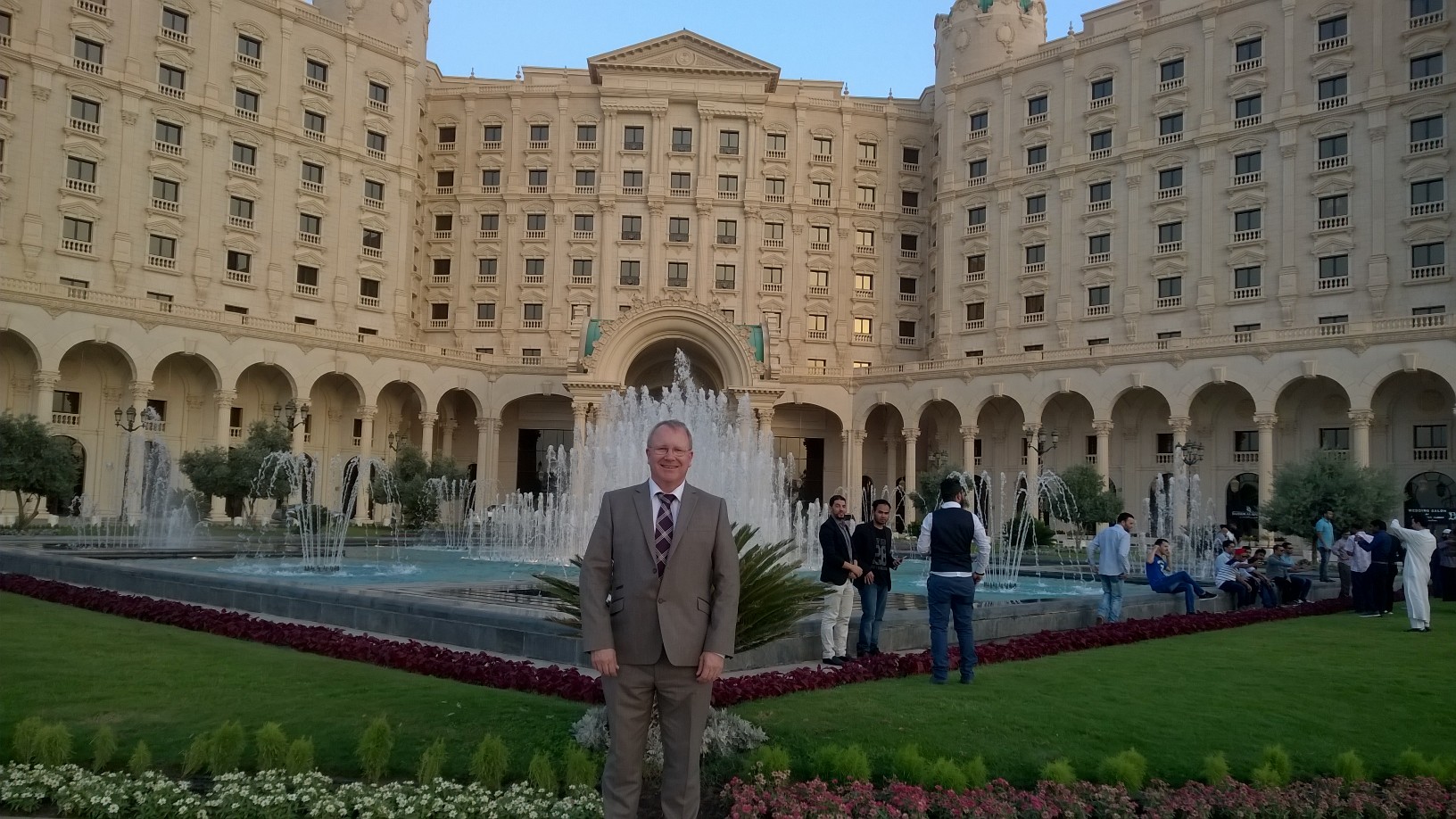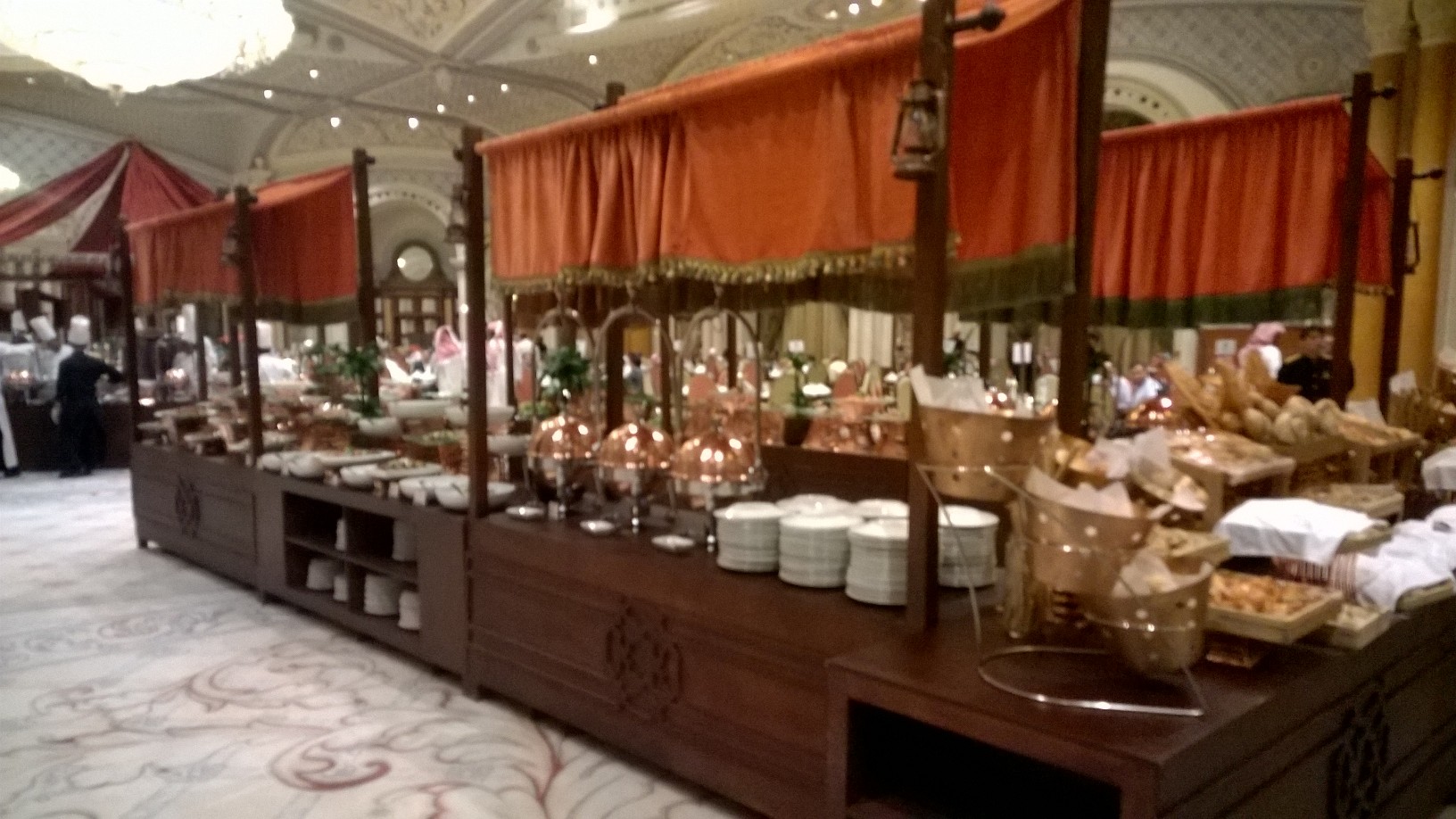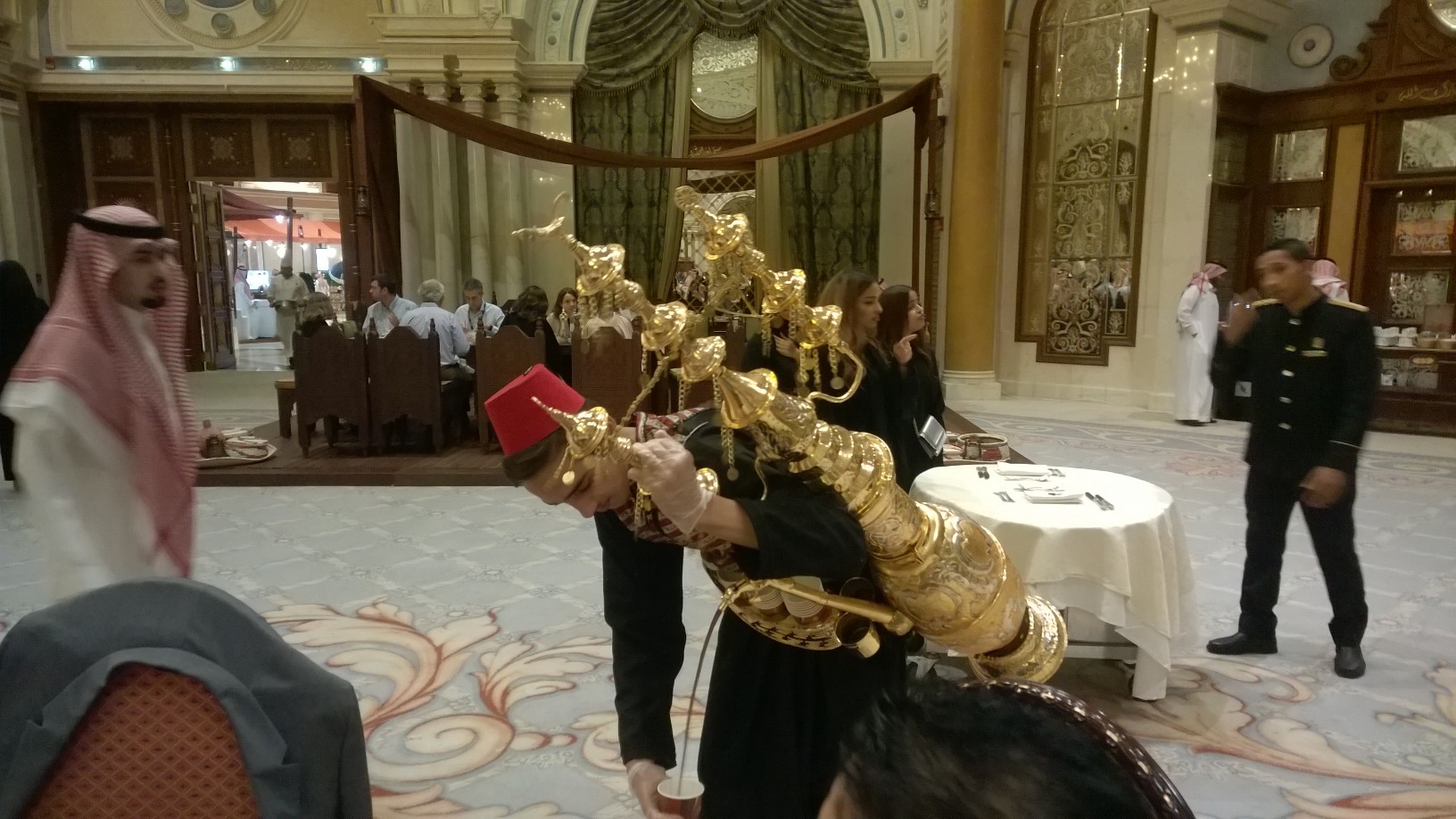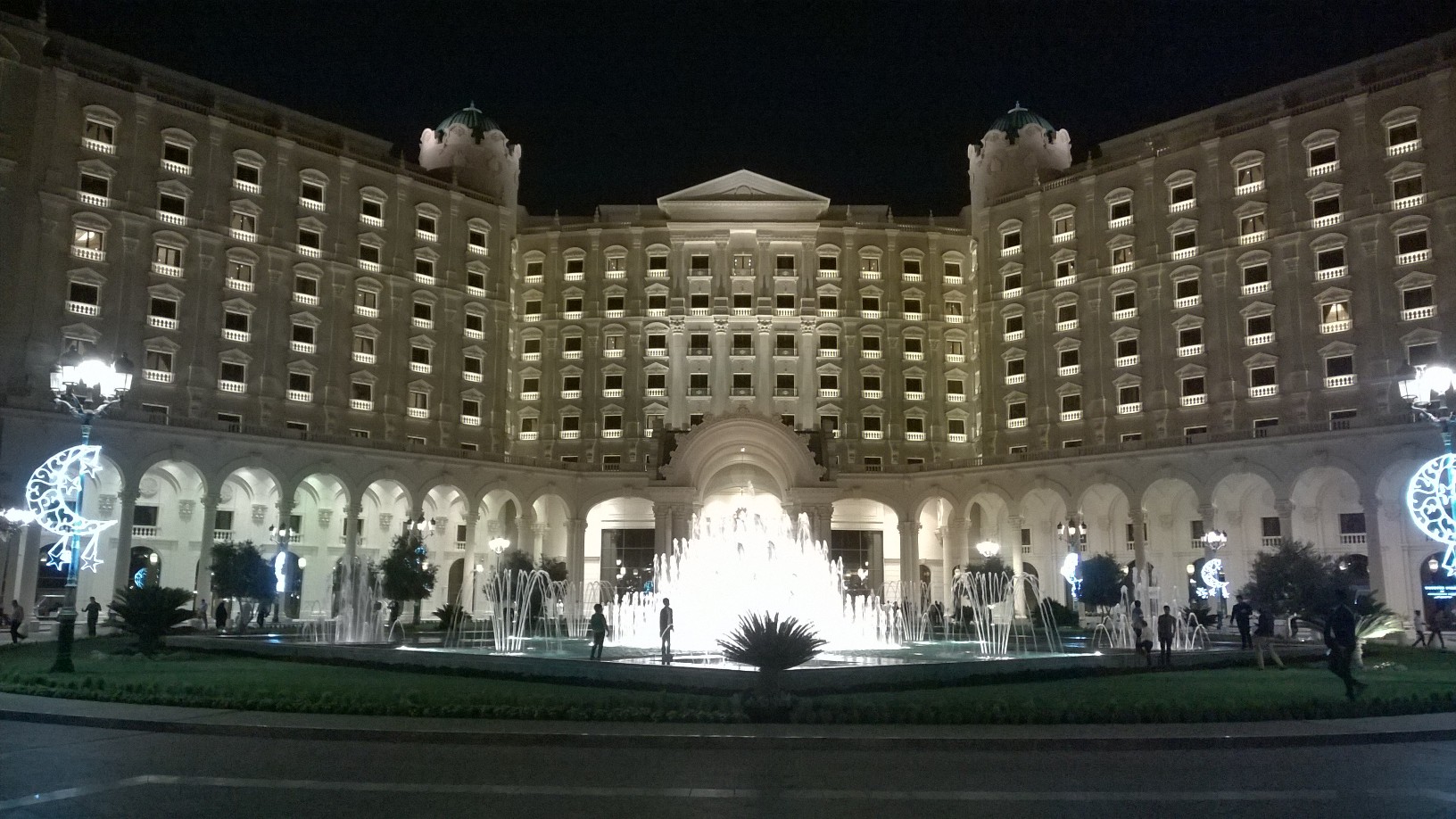Ramadan tales / Puttin’ on the Ritz
The holy month of Ramadan continues. And as I have come to learn, all normal life in the Arabic lands changes dramatically. Even us ex-pats who are not Muslims have to adapt to the ways of our hosts.
There is fasting from dawn until dusk, and that includes even drinking of water. The only exceptions are those condoned by scripture in the Holy Koran, and as far as I understand are restricted to children, pregnant women, travellers on a journey, or those who are ill and being treated. So unless you are in hospital or in the departure lounge of an airport, it is nil-by-mouth. One is permitted to chew on a miswak stick, which as I have found out this year, is a bitter-tasting twig, but once the thin outer bark is dealt with, is a fibrous thing which helps keep the saliva flowing and the mouth moist and fresh(ish).
Cafes and restaurants remain closed all day, and that includes all the fast food joints too. The first meal for the Muslims is at sunset and is called Iftar, which translates as break-fast. As you can imagine the Iftar is greatly anticipated. Traditionally the first morsels to be consumed are dates and Arabic coffee, and more substantial fare follows. If one is invited to an Iftar, be it a formal event or even if you are passing an Arabic house at the right time, it is extremely rude to not participate. That said, most Arabs are positioned where they want to be at the minute Iftar is declared.
This year I was invited to participate in an Iftar at one of the most luxurious hotels in Riyadh, the (in)famous Ritz-Carlton.

Puttin' on the Ritz
Yes, the same place that last year became a prison for those high society people who were accused of corruption etc. After the last suspect was released earlier this year, the hotel returned to its intended use and had a bit of a tidy-up. I can report that the building is stunning and that the particular ballroom (B) that we used was impressive in every respect. Looking later at the hotel’s website I see that this room is 20,000 square feet in size, and can sit 2,000 diners at a time.

Starting point - the bread and soup servery
It was laid out as a central help-yourself buffet, and at feeding time (6.38pm) there was a huge scramble from the guests to the serveries. However, my host and I had arrived half an hour or so early, and he advised me to follow him and load up my plate from the groaning trenchers and have it ready at our table and await the starting signal. Good advice! But what was the starting signal? This was the resident imam calling for Mahgreb prayer, and his cry of Allah Akhbar was almost drowned out by the rush of hungry people heading for the centre. We however, remained sitting and serenely started to enjoy our dates, coffee and then our pickings that were already in front of us. It was a privilege to be able to enjoy such a meal with our Muslim friends.

Dispensing the tea
I had a sneak peek at the Ritz-Carlton’s price list (again on t’internet) and saw that their Iftar price is 350 Riyals this year – that’s approximately £70 – however there seems to be a corporate rate too which would no doubt be cheaper. Even so, another memory to store away.

On my way out - the Ritz after sunset
Talking of imams, they themselves are kept busy during Ramadan. As well as the six prayer times, they have the task of reciting the entire Holy Koran during the month. And just to make sure that all the Muslims have the opportunity to hear it, they do their readings broadcast from the loudspeakers on the mosque minarets. This seems to take about an hour each evening and is added on to the final Isha’a prayers of the day. Our compound, like most areas of Riyadh is within listening distance of several mosques, so we are treated to much Koranic text every evening. And indeed as I write at 00.45 they are at it again. Perhaps they are behind in the readings and are on a catch-up?
Our hours at work have been reduced a little, and those of our Saudi colleagues by even more. As the month progresses, I can see them becoming more and more tired, and the work output across the Kingdom is much reduced during Ramadan. Had there been a car factory here, I would not like to have bought a vehicle that was built at this time of year. Elaine reports that in her school, the kids – those that actually come in – are falling asleep at their desks, and that the quality lessons that she has prepared are largely wasted. Fortunately much of the school curriculum is revision and projects just now.
One positive aspect is the traffic, the rush hours are completely changed and appear to be 5.30 to 6.30pm and 1.00 to 2.00am. This makes my morning drive to work an absolute pleasure as I have five lane freeways all to myself. When I finish in the afternoon it is a bit busier but still a lot easier than normal. I have learned not to drive between 5.30 and 6.30pm, as the behaviour of hungry and tired drivers anxious to be at their chosen point for Iftar is appalling, even by usual Riyadh standards. I read in the newspaper of an accident in an eastern city in KSA 5 minutes before Iftar time where a car containing 3 Saudis crossed a closed level crossing in the wrong direction and ended up being hit by the approaching train.
The shop hours are weird too. Many are closed all day, and then open after Iftar (or in some cases after Isha’a at 9.30pm) and close at 2.00 am, in time for all concerned to go home and enjoy Suhoor, their last meal of the night before the daytime fast kicks in again. Last Friday night we went out shopping, we started at 10.00pm and finished at 1.00am. The mall we were at was thronged and the car parks were full. I’m glad I’m not in the retail trade here.
I’ll give the last word again to the reporters at Arab News:
“The Fast and the Furious”
“Ramadan is supposed to be a time of spiritual renewal and contemplation – but in Jeddah, at least, it’s a different story as authorities struggle to deal with a dramatic spike in the number of fights, traffic accidents and road-rage incidents.
According to the Saudi Red Crescent Authority (SRCA), the city has witnessed 178 “physical confrontations” since the beginning of Ramadan. An SRCA spokesman, Abdullah Abu Zaid, told Arab News that in the first two weeks of the holy month alone, there had been 282 collisions on the city’s roads and at least 70 people had needed emergency treatment after being run over by motorists (that’s in 16 days – AF).
Meanwhile, emergency departments at 13 hospitals in Jeddah have handled more than 16,650 cases in the first seven days of Ramadan, according to the Health Ministry.
What do many of these incidents have in common? They all took place an hour or two before iftar. Now experts are blaming the aggressive, pre-iftar behaviour on the Ramadan fast and its effects on the human body.”
Hmmm. With a population of 2.9 million, that’s a hospitalisation rate of 1 in 175 people for one week. Normalised for a year, that would equate to over 1 in 4 people being taken in for emergency treatment. Wow.
